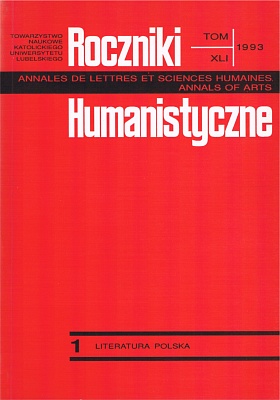Franciskanism in the Literary Work of Stanisław Witkiewicz
Abstract
It was Stanisław Witkiewicz’s interests in Franciscanism that made him take up a very original work, that is, translating broad passages of „Little Flowers of St. Francis” into the language of the Polish mountaineers, into Podhale dialect (From the Tatras, 1907). The author of „On the Saddle” was, as it is well-known, a great lover of the mountaineers’ language, creator of the so-called Zakopiane style. He saw in the mountaineers’ language a source of the regeneration of Polish culture, „a living national sacrum”. In this context „Little Flowers” have taken on a particular meaning. It was rendered in the folk’s speech with whom Witkiewicz set his great hopes.
In the volume „From the Tatras” apart from „Fioretti” the writer placed stories based on the Franciscan conception of reality. The mountaineers, „people of the future”, put into practice in their life the idea of the Saint of Assisi (Zośka Galicka, Wojtek Gandara, Jędrek Cajka). Simple, modest and often made light of people grow above mediocrityx and become „heroes of ethics”. Witkiewicz expressly meant to link the world of values of the mountaineers with Franciscan spirituality which he held in high estime. One may then talk here about Tatra culture subjected to Franciscan sacralization, but also about Franciscanism which bears the explicit Tatra signs.
The problem of the changes in man takes on a great significance in the collection entitled „From the Tatras”. This change constitutes the most essential Witkiewicz’s conception of „man of the future”. It is to be man internally regenerated by love and suffering who „in the development of his inner essence reaches the point which the whole humanity has to cross in order to live a higher life [...] who reaches this point of development which St. Francis has reached”. („Zośka Galicka”).
The considerations on „man of the future” allow us to state that Witkiewicz understood the essence of Franciscanism in a very specific manner, somewhat remote from authenticity. The writer exposes too much the sphere of feelings in living religious values, perceiving in the Saint of Assisi above all his spontneity, independence and inner unabrasiveness.
Copyright (c) 1993 Roczniki Humanistyczne

This work is licensed under a Creative Commons Attribution-NonCommercial-NoDerivatives 4.0 International License.





